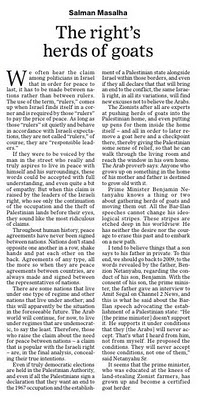The vicissitudes that have, for some reason, been collectively dubbed the 'Arab Spring' are neither Arab nor Spring. One can say that they are actually living proof of the identity crisis and reverberating bankruptcy of Arab nationalism.
Salman Masalha ||
Neither Arab nor Spring

The vicissitudes that have, for some reason, been collectively dubbed the "Arab Spring" are neither Arab nor Spring. One can say that they are actually living proof of the identity crisis and reverberating bankruptcy of Arab nationalism. We must remember that the intifadas that brought the masses to the streets took place in countries that have been ruled by governments considered to be nationalist. They passed over the monarchies, and there is a simple reason for that.
From the first days of Islam, through to the disintegration of the Ottoman empire, the Arab world has been ruled by monarchies in the form of various caliphs. The first caliphs were Arabs who conquered land and established empires. In Arab lands, the legitimacy conferred on rulers was fundamentally tribal, and resembled monarchy. Over time, Arab rule weakened. The caliphates remained Islamic, but the caliphs were no longer of Arab descent.
Nationalism was a new idea. The founding of Arab nationalism had two phases: First there was traditional Bedouin nationalism, while urban nationalism developed later. Traditional nationalism was encouraged by Britain, the colonial power that sought to secure hold of the important areas by taking them over from the Ottomans. Lord Horatio Kitchener, who served as the British secretary of state for war during World War I, actively pursued this goal, working to restore the Arab caliphates.
We know about this from a letter sent in August 1915 from Sir Henry McMahon, the British high commissioner in Egypt, to Hussein bin Ali, the sharif of Mecca: "We rejoice, moreover, that your Highness and your people are of one opinion - that Arab interests are English interests and English Arab. To this intent we confirm to you the terms of Lord Kitchener's message, which reached you by the hand of Ali Effendi, and in which was stated clearly our desire for the independence of Arabia and its inhabitants, together with our approval of the Arab Khalifate when it should be proclaimed. We declare once more that His Majesty's Government would welcome the resumption of the Khalifate by an Arab of true race."
The region was ultimately left without either an Ottoman caliphate or an Arab one. It was divided between Britain and France, and the Arabs got the condolence prize: the Arab League.
The second phase of Arab nationalism developed in the context of the colonial powers' withdrawal from the region and the Cold War. The Arab world, which was divided into "autonomous" entities, continued to be ruled by puppets controlled from afar. Then a new player - the Soviet Union - entered the fray, and the new nationalism fell into the net of the Soviet bloc. This nationalism was created in an unnatural process. Junior officers had brutally raped their people and their lands, and a new kind of regime was born of this assault: a political bastard in the Arab world, neither a monarchy nor a republic.
These governments promised the world, and national pride, but their existence was essentially dependent on empty slogans. All their energy went into maintaining their hold on the reins of power, at any price. And that's how the Arab world got where it is today. One can say that Arab nationalism, in both its empty forms, flunked the reality test.
There is an Arabic phrase that tells us the drowning man hangs by ropes made of air. These days, the ropes of air are being held out to the Arab world by the modern-day successors of Kitchener and McMahon. This time, it is being done through assistance to Sunni Arab Islam and with prominent Turkish-Ottoman support, in the hope that the new regimes will counter the increasingly strong Shi'ite Islam at Iran's helm. But this is just another golem that is liable to turn on its maker.
*
Published: Opinion-Haaretz, 5 Dec. 2011




 Salman Masalha
Salman Masalha




